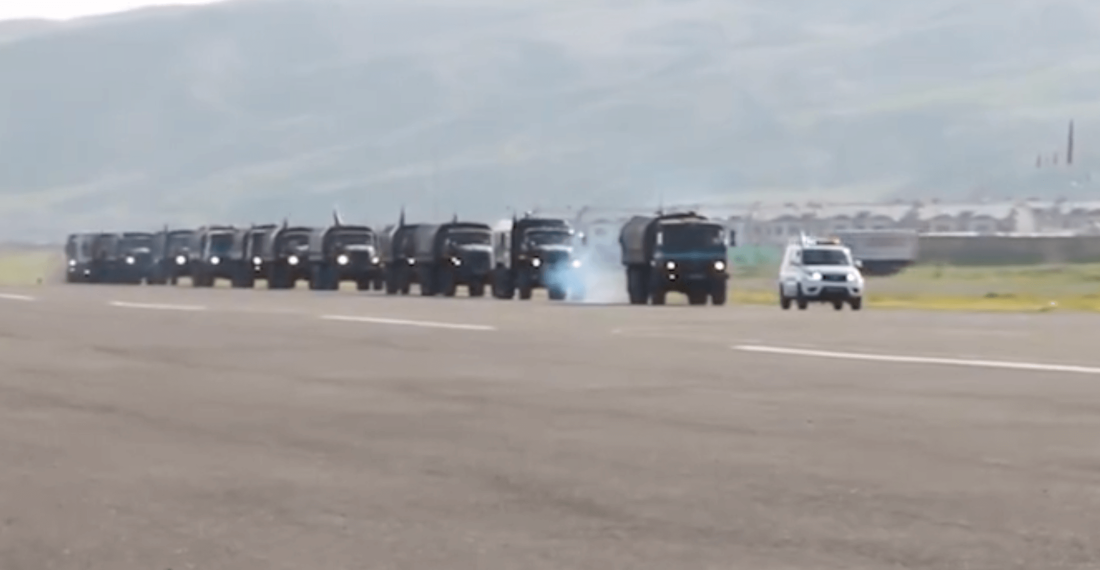The Russian Army has started leaving Nagorno-Karabakh. The military contingent of around two thousand troops deployed there with much fanfare in November 2020 started leaving unceremoniously on Wednesday (17 April) eighteen months before its scheduled departure. Many in 2020 believed that once in Karabakh the Russians will never leave. Having a strategic foothold there had been a major Russian objective for decades, and the Russian Army does not have a track record of leaving voluntarily from places where it is deployed.
The deployment of the “Russian peacekeeping” contingent was one of the points agreed in the trilateral declaration of 10 November 2020 which ended the 44-day Karabakh War. With the Armenians in a state of disarray following a crushing military defeat the contingent was seen by the Armenian population of Karabakh as a redeeming presence. Russian troops were greeted with flowers, and very soon Russian language classes sprung up in Stepanakert. But, like many other things in Karabakh, it was a delusion. This Russian peacekeeping effort was not the same as that seen in Abkhazia and South Ossetia in the 1990s. From the beginning, Azerbaijan insisted on strict rules for the deployment, and a clear understanding both of why they were there, as well as of the fact that this was a temporary mandate lasting only until November 2025.
Very soon the Russian military contingent stopped being a crucial factor and became an oddity. In the wider world Russia’s invasion of Ukraine, disrupted the international order and Russia got entangled in a war that put big demands on its military resources. But even more poignantly, things changed on the ground, with Armenia and Azerbaijan for the first time negotiating with each other without Russian mediation. Being out of the loop of the discussions meant that the Russians were constantly trying to do catch up and adjust their peacekeeping role accordingly. As Armenia took big steps to normalise its relations with Azerbaijan, including by accepting Azerbaijani jurisdiction over Nagorno-Karabakh the Russian position became increasingly difficult and awkward. The situation deteriorated further as the gap between the Pashinyan government in Yerevan and the leaders of the secessionists in Stepanakert widened. All of a sudden Moscow saw the grave risk that it would be perceived as simply providing a safety net for hardline Karabakh separatists that were not interested in working with Baku for a solution. Baku made it clear it would not tolerate this.
Managing relations with Azerbaijan has been one of the foreign policy projects that Vladimir Putin has personally dedicated considerable time and effort to in the last twenty years. Having lost Baku for Ankara, Moscow does not want to lose it also to the West. So throughout 2022 and 2023, the signals became clear that Moscow would not intervene to stop Baku from finishing the job in Karabakh, by asserting full control over the territory. When Azerbaijan blocked the Lachin corridor, the Russians hardly intervened, and when in September 2023, the Azerbaijani Army launched a military operation to take over Karabakh the Russians just watched. The Armenian resistance evaporated within hours, and a mass exodus resulted in the displacement of the entire Armenian population of Karabakh, leaving the territory empty. How does a peacekeeping contingent keep the peace in an empty territory?
Behind the scenes in the last eight months, Moscow and Baku discussed what to do next. Baku wanted the Russians out as soon as possible. It is a position in line with their mantra that they will solve all remaining issues on their own. In discussions with Moscow it is likely that Baku would have argued that it is not possible for it to resist Western pressure for some kind of presence on the ground in Karabakh whilst the Russians were there. For Moscow a foothold in Karabakh was something they sought for decades. To lose it was painful, but the prospect of having around them US and EU missions was even more unappetising, so they settled for the best of two bad options
This week’s departure was not formally announced until it had started, and then in a somewhat uncoordinated way. There were no farewell ceremonies. Moscow confirmed it but did not comment. Baku said that the decision had been taken by the leadership of the two countries.
The question arises, did Baku have to pay a price for securing the departure of the Russian troops, and are its hands on other issues now tied? In both its relations with Armenia, and with the West Baku has been acting somewhat peculiarly for the last year. Aliyev is hoping that everything will fall neatly in place, and is playing a strong hand. But the region is full of surprises so uncertainty on many issues remains.
The departure of the Russian contingent from Karabakh seals the future of the regions. The Armenian dreamers who still think of creating an Armenian state in Karabakh now understand such a prospect no longer exists, and they speak of a Russian betrayal.
Most people in the Caucasus are pleased to see another Russian military contingent leave the region. So long, farewell and “do svidaniya”!







